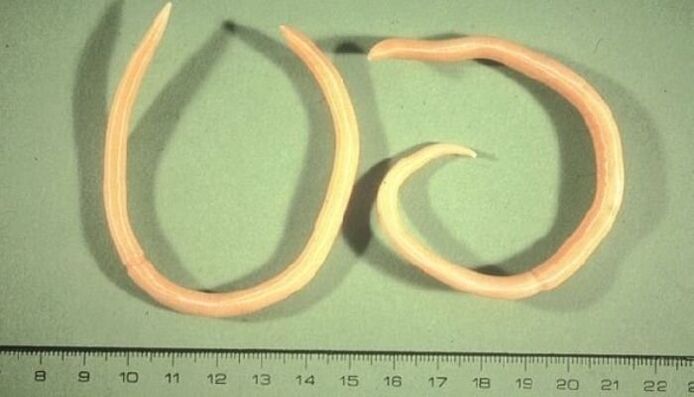
Helminthiasis is one of the most unpleasant and vile diseases. Parasites live in the human body, poison the body and cause chronic diseases. You can get sick for years without even knowing it - this stage of helminthiasis is called the erased course.
Due to the impossibility of completely preventing the entry of worms into the body, it is necessary to know the symptoms that they cause, not only in childhood, but also in adulthood.
first symptoms
The main danger of the disease in the first stage is that it is quite difficult to detect parasites. The symptoms often coincide with the causes of other diseases.If you find the following sensations and signs, it is recommended to take a test for helminths:
- unreasonable rise in temperature;
- lymph nodes are unusually enlarged;
- aching pain in muscle tissue and aching pain in the joints;
- teeth and skin turn yellowish;
- anal itching;
- Increased appetite;
- periodically appear rashes on the skin;
- swelling in the legs, arms and fingers;
- Diarrhea;
- abdominal pain and gas;
- Bitter taste in the mouth;
- frequent snoring;
- insomnia or restless sleep.
Similar symptoms with a probability of 70% indicate an invasion. You should immediately consult a doctor and get tested for the presence of parasites.
Important!Even if a medical examination of stool and blood did not show the presence of worms, you should still take the medications recommended by the doctor. Tests are not always able to detect helminths the first time.
bowels
The gastrointestinal tract is the main residence of the parasites, although they can spread to any internal organ. Knowing what symptoms exist, you can successfully narrow down the list of helminth species that have settled in the body. By what signs are worms in the gastrointestinal tract determined?
- One of the symptoms is joint and muscle pain.
- feverish state
- Weakened immunity and the development of various diseases of the gastrointestinal tract.
- The total number of eosinophils (a subspecies of white blood cells) in the blood increases.
- Allergic reactions occur.
Tapeworms provoke the appearance of manifestations similar to those characteristic of nematodes.If you find such signs, you should see a doctor and undergo a full examination for different types of parasites.

Lungs
No less dangerous are the parasites that have settled in the respiratory system. In some species, the developmental cycle necessarily includes passage of the larvae through the host's lungs. They then return to the intestines through the mouth when they are swallowed.Possible signs:
- First of all, chest pains and tingling appear.
- It becomes difficult to breathe - a person is accompanied by shortness of breath and suffocating attacks.
- There is an infection of the lungs with parasites against the background of an uncomfortable and weakened state of the whole organism.
- Body temperature rises rapidly.
- In the morning the patient wakes up from coughing fits with expectoration.
- There are problems with the organs of vision.
- The person suffers from extensive allergies.
- Those infected lose their appetite. There are signs of toxin poisoning.
- Increased headache.
- Vomiting and nausea.
Liver
In the largest human gland, which performs many important functions, worms also settle. They interrupt your work, causing dangerous diseases.The following manifestations may occur:
- Due to the activity of parasites, anemia develops. Hemoglobin concentration and total red blood cell volume decrease. Attention is not focused. The patient acquires pale skin and quickly tires of any activity.
- The chair is liquefied.
- Symptoms such as swelling and itching appear.
- The whole body feels sore.
- The patient has a fever and begins to lose weight rapidly.
- A person infected with worms is constantly sick and vomits.
- Significant worsening of appetite.
- It seems that the liver has become larger in size.
- Severe nettle rash.
- The patient appears ill.
Important!In advanced cases, parasites in the liver lead to nervous disorders, duodenal ulcers, irritability, headaches and other dangerous consequences.

eyes or brain
An extreme danger to human life and health is represented by worms that have chosen the organs of vision and the brain as a place of residence. Timely diagnosis of parasites in these places will prevent brain damage and blindness.
- Eye damage manifests itself as follows:
- Inflammation of the conjunctiva by larvae trapped in it.
- The eyelids swell like a boil.
- The patient feels something moving in the eyes.
- Extended ornate lines appear on the skin of the eyelids.
- Conjunctivitis is one of the consequences of infection of the organs of vision by parasites.
- Brain damage is expressed as follows:
- Nervous tension and nervous breakdowns.
- Sleep problems leading to constant insomnia.
- It became difficult to drink alcohol. The intake of strong drinks causes severe pain in the head.
- The back of the head and the temples are the main places of pain.
- Depression does not stop and only gets worse.
- During headaches, the infected parasite is constantly sick and wants to vomit.
- Sudden problems with the eyes begin.
Only a qualified doctor can accurately determine the diagnosis. In addition to therapeutic and hospital examination, the patient is advised, if possible, to contact laboratories specializing in the diagnosis of parasites.
The most common symptoms
Many signs of infection are common to most roundworms or tapeworms. After identifying the main consequences, it is worth moving on to identify a specific type of parasite for effective treatment with a suitable drug. Possible symptoms of helminthiasis:
- A skin rash is one of the main signs of a parasitic invasion. They can be ordinary acne spots, chiria, papillomas, hives or eczema.
- Chronic cough does not go away after taking antibiotics and expectorants.
- Reduced immunity does not allow the patient to get out of a state of constant cold.
- The movement of the worms within the body causes severe pain in the joints.
- Blockage by large helminths of the rectum, pancreas and gallbladder is expressed in constipation and swelling.
- Increased nerve activity causes teeth grinding.
- Problems with the work of the gastrointestinal tract cause irritability.
- Inflammation of the upper respiratory tract is accompanied by a runny nose, pneumonia and other diseases. Especially such symptoms are characteristic of diseases with strongyloidiasis (intestinal acne) and ascariasis (roundworm).
- Metabolic disorders and poisoning by the products of the activity of worms cause a chronic depressive state.
The symptoms will allow an experienced therapist to distinguish a parasitic infestation from diseases that have similar signs. During the active phase of reproduction, the diagnosis is clarified with the help of tests.

Symptoms of infection in children
Helminths are very dangerous for the youngest representatives of the human race. Detecting parasites in children in time is essential for their healthy development. Sometimes the signs of worms in a child's body seem harmless enough, so parents need to be very careful.
- If the baby snores in sleep and sleeps poorly, she should think about the presence of pinworms in the fragile body. They affect brain tissue, causing nerve reactions.
- General and local manifestations of an allergic reaction are also characteristic of invasion. Giardia causes the following common reactions: cracked nails, bronchial asthma, rhinitis. Local reactions are found in such signs: itchy skin, dry cough and asthmatic spasms.
- The consequences of a weakened immune system in children are inflammation of the paranasal sinuses (sinusitis), lesions of the oral mucosa (stomatitis), inflammatory processes in the female organs (vulvovaginitis), and bacterial vaginosis.
- Ascariasis and diphyllobothriasis (broad tapeworm) cause aggressiveness and irritability in children. This happens due to poisoning of the brain with helminth debris.
- Hormones produced by certain types of parasitic worms cause fluid malabsorption in the gastrointestinal tract. This leads to disruption of stool and diarrhea.
If a person has worms, what symptoms can be detected regardless of age? From depression and allergies to serious diseases of the internal organs, brain and nervous system disorders.Children are particularly susceptible to the negative effects of parasites.In infants, chronic poisoning with toxic waste products from various worms causes mental disorders and developmental delay.
The first symptoms should be an alarm signal about the need for an urgent diagnosis and adequate treatment of an established disease. Having rid the body of the presence of helminths in time, the patient will soon recover and return the joy of life.
Timely medical consultation will help determine the exact type of helminths, which will accurately prescribe effective treatment procedures.


























